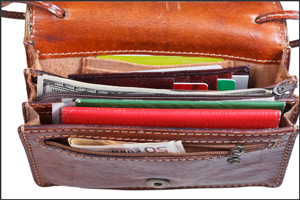Whether it comes from your parents (who worry about you!), other well-meaning relatives, or clueless friends, outdated and old-fashioned financial advice is all around you…advice such as “Keep all your money in savings!” “You must have a 20% down payment to buy a house!” “Max out your 401(k)!”
To stop the spread of bad money advice, we asked team members at Diamond Credit Union to share some more outdated financial tips that their members still hear to set the record straight.
Credit Cards are Bad
 Outdated financial advice on credit cards is, hands-down, what they hear most often!
Outdated financial advice on credit cards is, hands-down, what they hear most often!
“Members think having open credit card accounts is a bad thing because credit cards are bad.”
“Members think it’s a good idea to close a credit card when they pay it off.”
In reality, credit cards are a great way to build a strong credit score, when used responsibly. Responsible credit card use includes limiting the number of credit card accounts you open, only charging 30% of the maximum capacity on your cards, and paying off your card balances each month. Smart credit card use and a reliable pattern of paying your bills on-time and in-full is one of the easiest ways to increase your credit score.
Another financial tip we hear about credit cards is:
“People think they have to carry a balance on a credit card to build credit and, in turn, they pay a lot of interest.”
You don’t need to carry a credit card balance to use credit cards as a tool for building a credit history. In fact, paying your full balance each month is crucial for a good credit rating. When you carry credit card debt, the only thing you’re doing is ensuring that you pay more money each month in credit card interest. Not only do credit cards charge high interest rates, they charge compound interest. Each day your credit card issuer charges interest on your unpaid balance. If you don’t pay your balance in-full by your due date, you’re essentially paying interest on top of interest.
The Bank Will Tell Me What Home I Can Afford
 “My mortgage person can tell me what I can afford.”
“My mortgage person can tell me what I can afford.”
When getting pre-qualified for a mortgage, you supply a lender with financial information which includes your income, assets, and outstanding debt. With this information, the lender will provide feedback on how much mortgage you could qualify for and how much money they would feel comfortable lending you. In most instances, however, this pre-qualification amount is much higher than you plan on spending on a new home.
You do not need to spend as much money as you qualify for and you must take into account the additional costs beyond the mortgage such as taxes, maintenance, etc. Instead of following this outdated financial advice, you should create a budget. This will give you a more practical answer to how much you can afford or would like to spend on a new home. Create a list of your monthly income and monthly expenses (excluding your current rent or mortgage). Don’t forget to factor into your budget short-term goals such as vacations, holidays, summer camp for kids, and so on, before calculating for a home. The income remaining after all your expenses have been paid and you’ve put a little something into emergency, long-term, and short-term savings will show how much you can put towards a mortgage payment and home expenses.
Opening a Bank Account Builds Credit
 “Opening a credit union account or bank account in general will build credit.”
“Opening a credit union account or bank account in general will build credit.”
Unfortunately, your savings or checking accounts are not taken into consideration when your credit score is calculated. This means opening an account will not do anything to bump your score. That’s old-fashioned financial advice.
However, a savings account can benefit you in other ways. For example, when you are applying for a loan, lenders may see a credit union account in good-standing as a sign that you are a financially-stable applicant. Additionally, an emergency savings fund will help you remain consistent in repaying your debt each month if things go awry.
So what is the best way to build a credit history? It’s not difficult. Just follow these steps:
- Build a stable source of income and work history.
- Apply for a credit card as a good tool to build a credit history. Cards with a lower spending limit are a safe place to start.
- Consistently repay your credit cards each month, on-time and in-full.
Cards with Chips are Completely Safe
 “Chip cards completely eliminate fraud so there is no need to be wary.”
“Chip cards completely eliminate fraud so there is no need to be wary.”
The introduction of chip-based credit or debit cards made great strides in protecting users’ financial information. The embedded microchip turns cardmember information into a unique code when used at payment terminals. Compared to the magnetic strips previously used when paying with chip cards, the account codes are more difficult to duplicate or copy. Additionally, this new payment method allows you to keep your card in your possession throughout the entire transaction, which is more secure than handing over your card to a cashier.
But as technology advances, so do cyber-criminals. Even with a chip card, you need to stay vigilant when making purchases.
- Avoid the temptation to save your card information on retailer websites. It may allow you to make future purchases more quickly, but it could put your information at risk.
- Don’t make online purchases when you are on public Wi-Fi. Wait until you are on a private, secure Wi-Fi connection.
- Be alert when using your card at self-pay stations (for example, at gas pumps or parking kiosks). Criminals often place card skimmers at locations such as these, which can record card information as cards are scanned.



